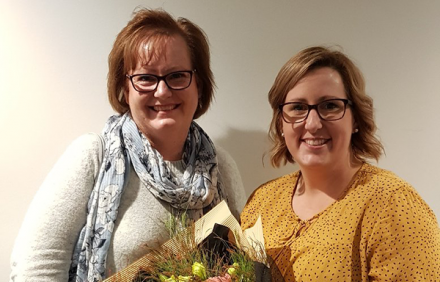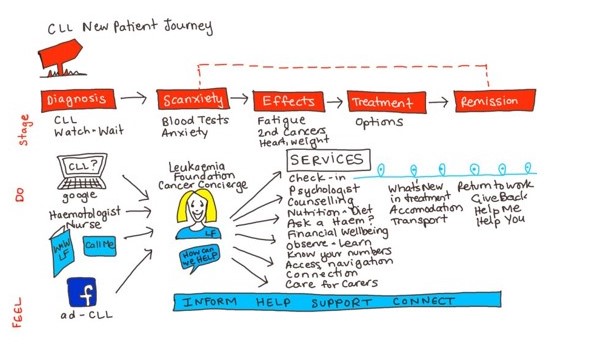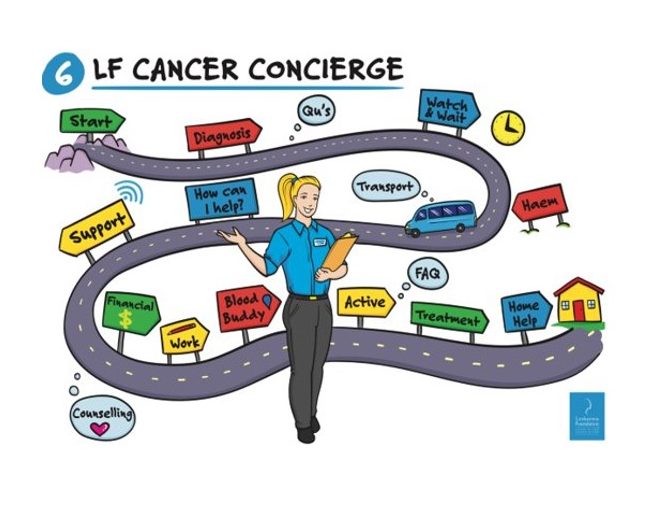Cancer Concierge Pilot: Assessing CLL needs and providing targeted interventions
More than 80 people with CLL signed up for the Leukaemia Foundation’s Cancer Concierge pilot program that ran for six months, is now closed, and is being evaluated.

Anecdotally, positive responses are coming through from participants about the support they received, according to the Cancer Concierge coordinators, Katherine Treble and Sheila Deuchars.
The Cancer Concierge pilot program was a natural progression from the CLL My Way wellness pilot program, which was reported in the last issue of CLL News.
Developed by the Leukaemia Foundation with support from Janssen and the CLL Australian Research Consortium and conducted in 2018, CLL My Way mapped the CLL journey and identified unmet needs.
Signing up for the pilot
The Cancer Concierge pilot program was advertised through Facebook from November 2018 to early-February 2019 when recruitment was closed having reached its target.
Participants could tap into the service through referral from a health professional or self-refer via the social media recruitment campaign.
“Interestingly, out of 167 inquiries, we only received one referral from a haematologist,” said Katherine.
“What that demonstrated to us is that health care professionals aren’t readily identifying the unmet needs of the CLL population and are missing the opportunity to refer people for supportive care.
“And the high level of inquiry demonstrated that people do have needs when they are living with CLL and there are a lot of vulnerable people who could benefit from support to live well with CLL. This is in line with the findings of CLL My Way.
“Cancer Concierge is a tailored and personalised program which assists people to navigate the disease and the health system through the provision of support, resources and interventions to meet those unmet needs,” said Katherine.
Pilot demographics
Participants in the Cancer Concierge pilot came from all states and territories, were aged in their early-40s to late-80s and covered all stages of the CLL blood cancer journey – newly diagnosed, watch and wait and those in treatment.
By far, the largest group of participants on the pilot program were the 50 people on watch and wait (which the Leukaemia Foundation refers to now as observe and learn*). Six people were newly diagnosed with CLL; 10 were new to treatment; and 10 participants were on second line treatment – seven on ibrutinib (Imbruvica®) and five on other treatments/clinical trials.
Assessing needs
Initial assessments were undertaken, with the Cancer Concierge assessment tool completed by each participant with CLL.
“Participants identified their own unmet needs,” said Katherine, and to meet those needs, interventions were provided around four key topics:
- physical wellbeing
- emotional wellbeing
- social wellbeing
- observe and learn.
“These interventions were personalised and individualised and provided in order of greatest need to least need.
“The assessment tool enabled us to identify exact areas where people needed support and guide interventions in those key themed areas. We were able to hone in on those specifics, based on what they told us in their assessment,” explained Katherine.
Physical wellbeing
A lot of the physical wellbeing themes raised around challenges with the management of fatigue are related to CLL.
“So, providing some support and resources that acknowledge fatigue, discussing strategies that someone can implement to alleviate or improve their fatigue and energy levels, and having conversations about pacing themselves, planning their day and prioritising tasks, can all help to maximise their energy levels,” said Katherine.
“But sometimes physical wellbeing is about dealing with the physical presentation of the disease.
“Some people have quite large lymph nodes and that causes a lot of uncertainty and worry, or they may change the way they dress, such as wearing a high-collared shirt to cover up the lymph nodes in their neck.”
Emotional wellbeing
Katherine cited two different examples – somebody with a low score in emotional wellbeing could indicate their needs were due to a lack of emotional support from family and friends, while another person’s emotional wellbeing needs may relate to anxiety around the uncertainty of the disease.
“If they were in the watch and wait phase, they couldn’t celebrate the fact that they didn’t have to have treatment because they were worried about their disease progressing,” said Katherine.
“Our support was about listening to their concerns and empowering them through information and understanding. Sometimes it was about connecting participants with psychologists for further support to manage that anxiety and for strategies to cope day-to-day with that uncertain situation and the chronic nature of their disease.”
For those living with a chronic disease, getting the emotional support they need is crucial.
“Family and friends don’t always acknowledge that they are unwell or understand the inconsistency or variability of their disease, and that it is a day-to-day proposition; some days are good, whilst other days are not so good,” said Katherine.
Social wellbeing
Sometimes people with CLL can’t agree to a social engagement or they withdraw from an agreed social engagement because they’re not feeling well.
“They grapple with not wanting to burden family and friends in seeking emotional support which can lead to withdrawing or isolating themselves from friendship groups,” said Katherine.
“They found the fact that we [the Leukaemia Foundation] can provide emotional support and information meant we could be that support person for them. Then they could rely on their family and friends for the social connection more so than for emotional/disease support.
Observe and learn
This theme focused on building knowledge and empowerment.
“We explored an individual’s thirst for knowledge about their disease and the symptoms they were experiencing,” said Katherine.
“We could then improve their understanding or help them clarify their understanding regarding topics like the disease itself, treatment, genetic testing and symptom management.
“Some people were in watch and wait at the beginning of the Cancer Concierge pilot and, by chance, progressed to needing treatment during the program, so their needs changed.
“They had different requirements for information when they needed treatment. That was a theme that came out of CLL My Way – ‘give me the right information at the right time’.
“People felt overwhelmed by information from the outset of their diagnosis and, if they were in the watch and wait phase, they didn’t necessarily need knowledge about treatment.
“But when they were going into treatment – that’s when they needed this information, when it had context,” said Katherine.
Use of automated journey technology
An automated digital journey was trialled as a way of delivering information and resources to the CLL participants enrolled in the pilot, with support provided through a combination of SMS messages, direct telephone contact, and follow-up emails.
Starting with a person’s greatest need – identified from their assessment results – their support began with an SMS message on that key topic. This prepared them for a phone call several days later from the cancer concierge and discussion around that topic.
The participant then received a follow-up email that included resources related to that topic.
“Each person’s needs were different, and the flow of information was based on their needs.
“Some people might benefit more from the regular person-to-person conversations (the human interaction) while other people might have benefited more from the resources they could look at in their leisure,” said Katherine.
Future applications
The Leukaemia Foundation is currently evaluating the program.
“What we learn from this pilot will help inform the services we provide in the future,” said Katherine.
“Part of our evaluation will be about understanding and interpreting how beneficial the program was in meeting individual needs as well as reviewing themes within the data that will assist to improve our service offerings for people living with blood cancer.
“There are plans to apply this same program format to another blood cancer population. This will help the Leukaemia Foundation to determine if there are translational themes that emerge in other disease types and understand if this program is suitable for various blood cancers, not just CLL.
“We will see if this way of assessing peoples’ needs and providing targeted interventions can be supported in other disease groups and shape the delivery of Leukaemia Foundation support services moving forward,” said Katherine.
“A large proportion of the participants had never tapped into the Leukaemia Foundation’s services before the Cancer Concierge program, so it’s also been a great way to get people engaged with our services.
“As the program draws to a close, we’re letting participants know that our support is never-ending and is always available through our blood cancer support coordinators, despite the completion of this pilot program,” she said.
We will report on the findings of the Cancer Concierge program in a future issue CLL News.
*This notion arose emerged in the CLL My Way program as a participant-driven response suggesting ‘watch and wait’ was ‘watch and worry’ and that theme had a negative connotation. The alternative suggestion was ‘observe and learn’ which was integrated into the Cancer Concierge pilot whereby participants observe their bodily symptoms and become in tune with themselves and learn about their blood tests and disease along the way. ‘Observe and learn’ has a more empowering connotation compared to the inherent negativity of ‘watch and wait’, or ‘watch and worry’, and has been positively received.

